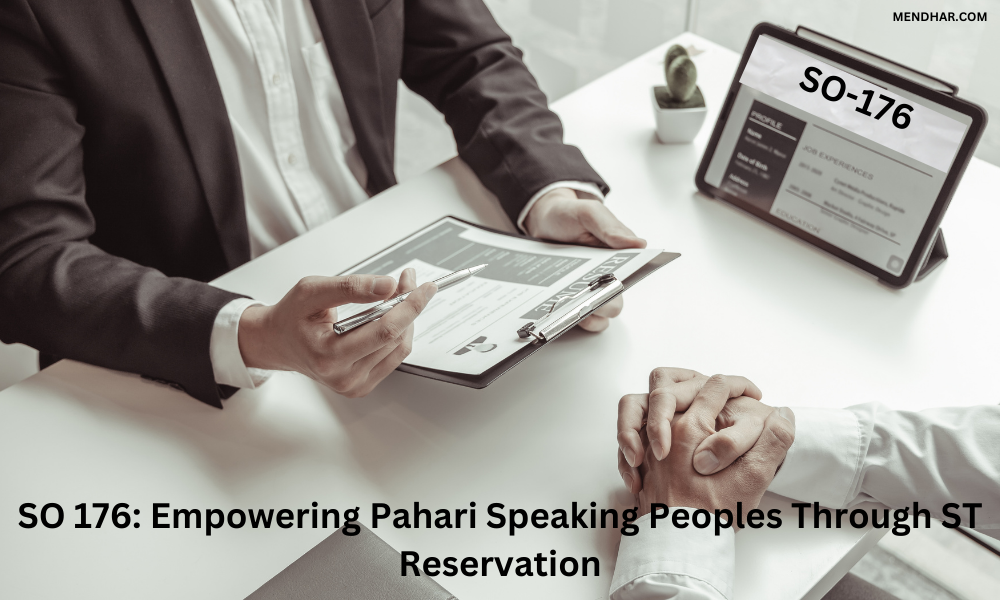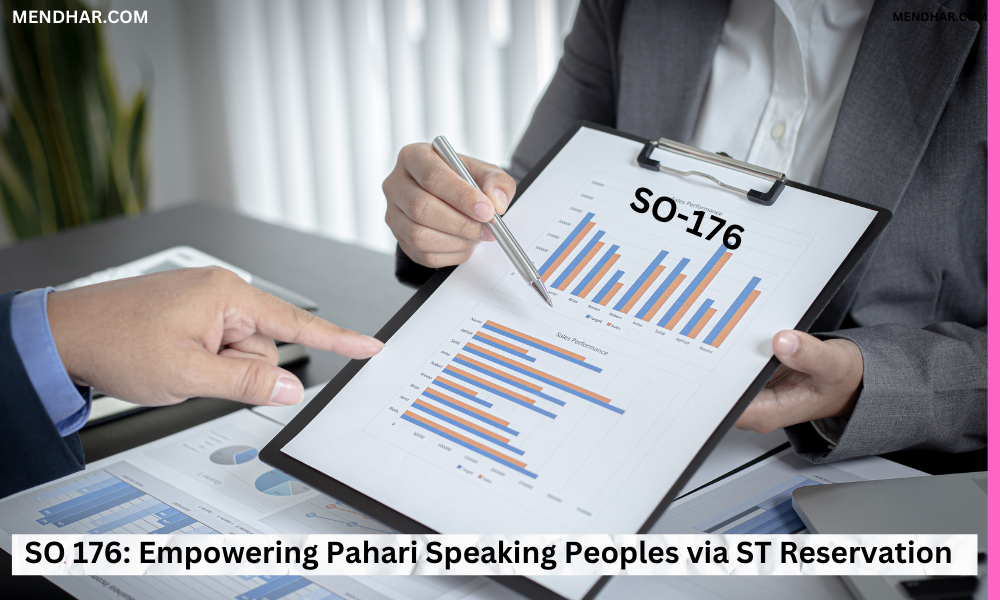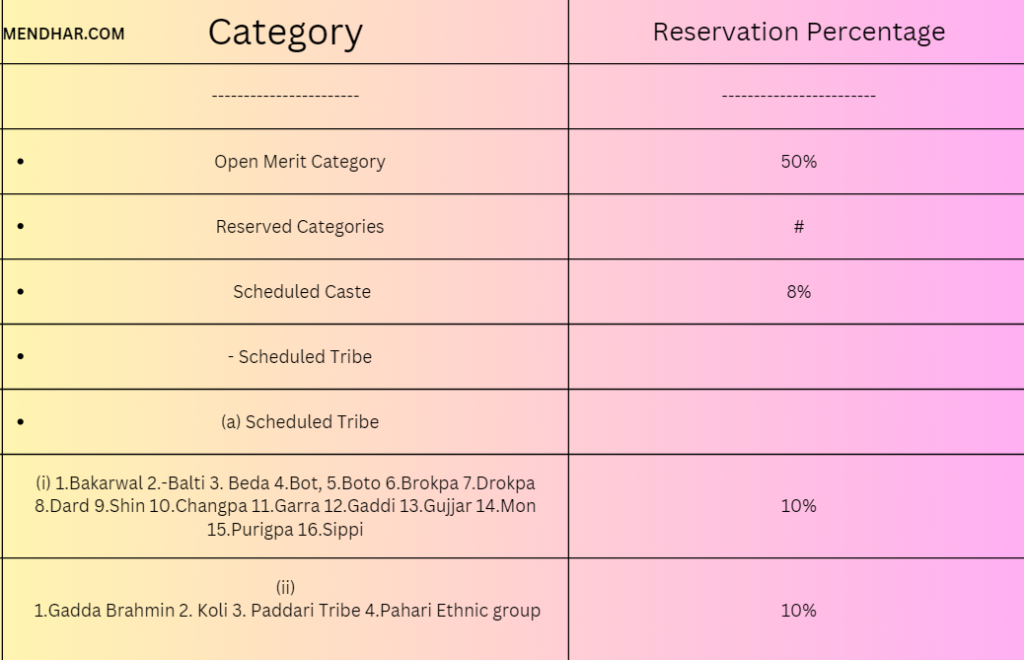Table of Contents
ToggleExposed SO 176: Empowering Pahari Speaking Peoples via ST reservation

Introduction:
In the vast tapestry of India’s diverse cultural landscape, the principle of ensuring equity and representation for all citizens stands as a fundamental tenet of governance. Recognizing the importance of addressing the unique needs and challenges faced by various marginalized communities, the Government of India has initiated numerous programs and policies aimed at promoting inclusivity and empowerment. One such initiative, known as SO 176, holds particular significance in its efforts to uplift and empower the Pahari-speaking peoples.
The Pahari community, predominantly residing in the hilly regions of northern India, encompasses a diverse array of ethnicities, languages, and cultures. Despite their rich heritage, Pahari-speaking individuals have often encountered socio-economic barriers that hinder their access to essential services, resources, and opportunities for development. Recognizing these challenges, SO 176 was introduced with the specific objective of addressing the needs of the Pahari community by issuing Scheduled Tribe (ST) certificates.SO 176: Empowering Pahari Speaking Peoples via ST Reservation.
Scheduled Tribe status in India confers certain privileges and benefits, including reserved seats in educational institutions, employment opportunities, and access to welfare schemes aimed at socio-economic development. By extending ST certificates to the Pahari-speaking peoples under SO 176, the government aims to provide them with greater visibility, recognition, and support within the framework of affirmative action policies.
The significance of SO 176 lies not only in its tangible benefits but also in its symbolic importance. Through this initiative, the government acknowledges the unique identity and cultural heritage of the Pahari community, reaffirming its commitment to inclusivity and social justice. By granting ST status, SO 176 seeks to rectify historical injustices, promote socio-economic empowerment, and foster a more equitable society where every citizen can thrive irrespective of their background.
Furthermore, SO 176 represents a step towards decentralization and localized governance, recognizing the diverse needs of different linguistic and ethnic communities across the country. By tailoring policies to specific linguistic groups like the Pahari-speaking peoples, the government demonstrates its responsiveness to the multifaceted nature of India’s social fabric.

Understanding SO 176:
SO 176 stands as a testament to the government’s commitment to inclusivity and social justice. It designates Pahari speaking peoples as eligible for Scheduled Tribe status, thereby opening avenues for them to access various affirmative action policies and programs. This move is not merely bureaucratic; it represents a recognition of the unique cultural and socio-economic challenges faced by the Pahari community.
Empowering the Pahari Community: The issuance of ST certificates under SO 176 holds profound implications for the Pahari community. It serves as a crucial tool in combating historical marginalization and discrimination. With ST status, Pahari individuals gain access to reservations in educational institutions, job opportunities, and other welfare schemes. This translates into enhanced socio-economic mobility and a more level playing field.
Challenges and Opportunities: While SO 176 marks a significant step towards inclusivity, challenges persist. Implementation issues, bureaucratic hurdles, and awareness gaps can hinder the effective realization of its objectives. Therefore, it becomes imperative for stakeholders to collaborate in ensuring smooth execution and dissemination of information regarding the benefits of ST certification under SO 176.

Who is eligible to apply for Pahari Ethnic tribe's certificate(ST)
In clause (iv), the following shall be added as second, third, and fourth provisos, respectively:
“Provided further that a person claiming the benefit under the Pahari Ethnic Group category must fulfill the following criteria:
(a) They must be a member of the Pahari Clan, Community, or Tribe having a distinct cultural, ethnic, and linguistic identity.
(b) The individual must be proficient in speaking the Pahari language, and their mother tongue must be Pahari.
(c) They must provide documentation such as Aadhaar Card, Voter Identity Card, or Domicile Certificate.
(d) Furthermore, the Tehsildar shall be the authority to certify the claim of persons belonging to said Category.
Provided also that the procedure for the identification of persons claiming benefit as part of the Paddari Tribe shall be as follows:
(a) A person claiming benefit as a member of the Paddari Tribe shall substantiate their claim based on revenue documents or any other documents establishing their ancestral belonging to the Paddar area of Kishtwar district.
(b) They must provide documentation such as Aadhaar Card, Voter Identity Card, or Domicile Certificate.
(c) Furthermore, the Tehsildar shall be the authority to certify the claim of persons belonging to said Category.
Provided also that the procedure for the identification of persons claiming benefit as part of the Gadda Brahmin Tribe shall be as follows:
(a) For a person claiming benefit as part of the Gadda Brahmin Tribe, the certificate issuing authority would satisfy themselves regarding the genuineness of the claim based on records produced by the applicant and/or local inquiry/report by lambardar/chowkidar etc.
(b) They must provide documentation such as Aadhaar Card, Voter Identity Card, or Domicile Certificate.
(c) Furthermore, the Tehsildar shall be the authority to certify the claim of persons belonging to said Category.”

CONCLUSION:
SO 176 represents a beacon of hope for the Pahari speaking peoples, signaling a departure from centuries of neglect and marginalization. By extending Scheduled Tribe status to this community, the government has taken a commendable stride towards fostering inclusivity and social equity. However, the success of SO 176 hinges on effective implementation and widespread awareness. As advocates for social justice, it is incumbent upon us to champion the cause of SO 176 and ensure that its benefits reach those who need them the most.
Frequently Asked Questions (FAQ) about SO 176 Reservation
What is SO 176 Reservation?
- SO 176 Reservation is a government initiative in India aimed at empowering Pahari-speaking communities through Scheduled Tribe (ST) status.
Who is eligible for SO 176 Reservation?
- Individuals belonging to Pahari clans, communities, or tribes with distinct cultural, ethnic, and linguistic identities are eligible.
What are the benefits of SO 176 Reservation?
- Benefits include access to reservations in educational institutions, job opportunities, and welfare schemes, fostering socio-economic mobility and equity.
How can I apply for SO 176 Reservation?
- Applicants must provide proof of Pahari ethnicity and linguistic background, along with relevant identification documents like Aadhaar Card or Domicile Certificate.
Who certifies eligibility under SO 176 Reservation?
- The Tehsildar serves as the authority to certify claims of individuals belonging to the Pahari Ethnic Group, Paddari Tribe, or Gadda Brahmin Tribe.
How does SO 176 Reservation combat historical marginalization?
- By recognizing the unique challenges faced by Pahari-speaking communities, SO 176 Reservation aims to address historical injustices and promote social inclusion.
Is SO 176 Reservation applicable nationwide?
- While SO 176 Reservation is a central government initiative, its implementation may vary across states depending on local administrative procedures.
Can individuals from other linguistic backgrounds apply for SO 176 Reservation?
- No, SO 176 Reservation specifically targets Pahari-speaking communities for Scheduled Tribe status and associated benefits.
Where can I find more information about SO 176 Reservation?
- You can refer to official government notifications, local administrative offices, or outreach programs for detailed information regarding SO 176 Reservation.




Pingback: SO 176 and the Process of Seeking Reservation for Pahari Ethnic Tribes -